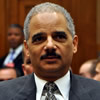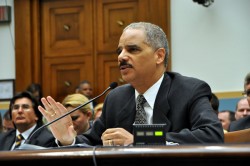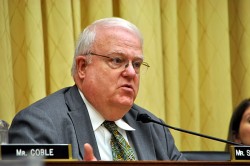National
Holder defends decision to drop DOMA defense
House Republicans criticize att’y gen’l for abandoning anti-gay law

U.S. Attorney General Eric Holder endured a barrage of hostile questions from House Republicans Tuesday over the Obama administration’s decision to drop defense of the Defense of Marriage Act in court.
During an oversight hearing before the House Judiciary Committee, Holder defended President Obama’s determination that DOMA is unconstitutional in response to inquiries from GOP lawmakers amid other questions about the Justice Department’s role in preventing illegal immigration, prosecuting terrorist suspects and stopping child pornography.
Tough questioning for Holder particularly came from Rep. Jim Sensenbrenner (R-Wisc.), who recalled Holder’s Feb. 23 letter to Congress stating that the Justice Department would no longer defend DOMA in court and asked the attorney general simply, “Why’d you do it?”
Holder replied that litigation challenging DOMA in the Second Circuit — where there’s no legal precedent for laws related to sexual orientation — afforded the opportunity for the Justice Department to examine DOMA with heightened scrutiny and to determine the anti-gay law was unconstitutional.
“Applying the heightened scrutiny test, we did not think that the statute would pass constitutional muster, and as a result, I thought that we could not make reasonable arguments in defense of the statute — something that is done extremely rarely, but happens occasionally,” Holder said. “I recommended to the president that we not defend the statute and he agreed with that recommendation.”
But Holder’s answer apparently didn’t satisfy Sensenbrenner, who railed against the Justice Department for what he said was abandoning its duty by dropping defense of DOMA.
“Sexual preference has never been a protected class in any of our civil rights laws,” Sensenbrenner said.
In response, Holder noted that federal law anticipates that the executive branch may determine that some laws shouldn’t be defended in court and affords Congress the opportunity to take up defense of such statutes if the administration declines to defend them.
“The reasons for the determination were, as I said, this different standard and the fact that much has changed since the passage of the bill 15 years or so ago,” Holder said. “The Supreme Court has ruled that criminalizing homosexual contact is unconstitutional. Congress has repealed the ‘Don’t Ask, Don’t Tell’ policy.”
But Sensenbrenner observed that Congress has never taken action to repeal DOMA since the anti-gay law was enacted in 1996. Additionally, the Wisconsin lawmaker said the Lawrence v. Texas decision that Holder referenced was related only to the criminalization of homosexual acts and that “Don’t Ask, Don’t Tell” was a personnel issue in the Defense Department.
“DOMA does not deal with either of these two items,” Sensenbrenner said. “DOMA was an attempt to define for federal purposes that marriage is between one man and one woman, and 45 states in this country have also reached that conclusion — either through a constitutional amendment ratified by the people as was the case in Wisconsin or through statutory enactments by the legislature.”
Sensenbrenner’s remarks on DOMA are misleading in part because Section 3 of the statute has no impact on states where same-sex marriage isn’t available. The anti-gay law prohibits federal recognition of same-sex marriage only in jurisdictions where it’s available.
Sensenbrenner added he would back defunding the Justice Department for the cost to the House of defending DOMA in court — a move proposed by House Speaker John Boehner (R-Ohio) last month after he hired former U.S. Solicitor General Paul Clement to take up defense of the statute.
“I certainly would support an effort to have the cost of Congress’ defending this provision … come out of the Justice Department’s appropriations, so that the message is sent down the street that an attorney general or president can’t willy-nilly decide that a law that they have voted against — if they’d been in Congress at the time — is unconstitutional,” Sensenbrenner said.
Holder replied that lower courts have also come to the conclusion that DOMA is unconstitutional and the notion that the Justice Department should lose funds over the decision to drop defense of the anti-gay law is “inappropriate.”
“The lawyers in the Department of Justice who would have worked on that case, believe me, have more than a full-time job, and they will have to use the time that might have been used in the DOMA defense — they will use it other areas,” he said.
The attorney general added Congress has the ability to approve funding for the expense of hiring Clement without reducing funds for the Justice Department.
Rep. Jerrold Nadler (D-N.Y.), the sponsor of DOMA repeal legislation, came to Holder’s defense during the hearing and said the Obama administration had no option but to determine the anti-gay law was unconstitutional following the 2003 Supreme Court decision striking down state sodomy laws in Lawrence v. Texas.
“I don’t believe that the administration had any choice in the matter at all by looking at the legal precedence,” Nadler said. “There had been no determination by any court, as far as I know, certainly by any circuit, of the proper standard of review after Lawrence. And if you look at the normal criteria for determining the standard of review that the Supreme Court has enjoined upon us as to what a suspect classification is … it meets all the tests, and you really had no choice but to go that route.”
Nadler added he hopes Congress doesn’t try to “start trying to intimidate” the Justice Department by threatening to restrict funds as a result of the department’s decision over DOMA.
Other Republicans on the committee also took jabs at Holder during their questioning for dropping defense of DOMA.
Rep. Trey Gowdy (R-S.C.), a freshman Republican who won as a Tea Party challenger in the 2010 election, asked if laws related to sexual orientation merited heightened scrutiny, why shouldn’t heightened scrutiny apply to laws on allowing cousins to marry, underaged marriage or polygamy.
“Since Lawrence, two courts of appeals have upheld a rational basis test for sexual orientation,” Gowdy said. “Why would you single out the one court of appeals that has applied a higher level of scrutiny, ignoring the two that apply to rational basis tests? That just strikes me as a political calculation and not a constitutional calculation.”
In response, Holder denied the decision the Justice Department made over DOMA had a “political component” and said the Supreme Court would ultimately have to address the issue of the anti-gay law’s constitutionality.
Michael Mitchell, executive director of the National Stonewall Democrats, told the Washington Blade after the hearing that he took offense to the suggestion that same-sex marriage is akin to the other unions Gowdy mentioned.
“Most people know there is a clear difference between those things and two loving, consenting adults who are willing to share their lives, and most importantly, take care of each other,” Mitchell said. “Apparently, love and commitment and ’til death do you part’ are not Republican values.”
House Judiciary Committee Chair Lamar Smith (R-Texas), who last year sponsored a resolution condemning the federal court ruling finding California’s Proposition 8 was unconstitutional, expressed displeasure over Obama administration’s decision to drop defense of DOMA during his opening statement.
“I am concerned that in some cases, this administration may have placed political and ideological considerations above enforcing the law,” Smith said. “It seems the president’s personal, political views regarding [DOMA] may have trumped the obligations of the Department of Justice.”
Additionally, Rep. Dan Lungren (R-Calif.) chided Obama for dropping defense of DOMA after making no mention about doubts over its constitutionality during his 2008 presidential campaign.
“It would have been helpful if the president of the United States, as a constitutional law professor, during the time he was running for president, indicated that he had some constitutional questions about DOMA as he was going around the country saying he believes that marriage is between one man and one woman,” Lungren said.
As a chair of the House Committee on Administration, Lungren signed off on the House contract hiring Clement for a initial total sum cap of $500,000 and a blended rate of $520 an hour.
In response, Mitchell disputed the notion that Obama wasn’t fully disclosing his views in the 2008 presidential campaign and said Obama’s personal position on marriage has no bearing on the constitutionality of DOMA.
“By Rep. Lungren’s logic, the Republicans should have articulated in the midterm elections that they were going to focus solely on divisive social issues and the foisting of tax cuts on the wealthy instead of creating jobs,” Mitchell said.
Holder’s defense of the administration’s decision to drop legal defense of DOMA during the congressional hearing comes on the heels of comments he made to reporters last week backing Clement against criticism from LGBT people for taking up defense of the anti-gay statute.
“Paul Clement is a great lawyer and has done a lot of really great things for this nation. In taking on the representation — representing Congress in connection with DOMA, I think he is doing that which lawyers do when we’re at our best,” Holder reportedly said. “That criticism, I think, was very misplaced.”
U.S. Supreme Court
Supreme Court to consider bans on trans athletes in school sports
27 states have passed laws limiting participation in athletics programs

The U.S. Supreme Court on Thursday agreed to hear two cases involving transgender youth challenging bans prohibiting them from participating in school sports.
In Little v. Hecox, plaintiffs represented by the ACLU, Legal Voice, and the law firm Cooley are challenging Idaho’s 2020 ban, which requires sex testing to adjudicate questions of an athlete’s eligibility.
The 9th U.S. Circuit Court of Appeals described the process in a 2023 decision halting the policy’s enforcement pending an outcome in the litigation. The “sex dispute verification process, whereby any individual can ‘dispute’ the sex of any female student athlete in the state of Idaho,” the court wrote, would “require her to undergo intrusive medical procedures to verify her sex, including gynecological exams.”
In West Virginia v. B.P.J., Lambda Legal, the ACLU, the ACLU of West Virginia, and Cooley are representing a trans middle school student challenging the Mountain State’s 2021 ban on trans athletes.
The plaintiff was participating in cross country when the law was passed, taking puberty blockers that would have significantly reduced the chances that she could have a physiological advantage over cisgender peers.
“Like any other educational program, school athletic programs should be accessible for everyone regardless of their sex or transgender status,” said Joshua Block, senior counsel for the ACLU’s LGBTQ and HIV Project. “Trans kids play sports for the same reasons their peers do — to learn perseverance, dedication, teamwork, and to simply have fun with their friends,” Block said.
He added, “Categorically excluding kids from school sports just because they are transgender will only make our schools less safe and more hurtful places for all youth. We believe the lower courts were right to block these discriminatory laws, and we will continue to defend the freedom of all kids to play.”
“Our client just wants to play sports with her friends and peers,” said Lambda Legal Senior Counsel Tara Borelli. “Everyone understands the value of participating in team athletics, for fitness, leadership, socialization, and myriad other benefits.”
Borelli continued, “The U.S. Court of Appeals for the Fourth Circuit last April issued a thoughtful and thorough ruling allowing B.P.J. to continue participating in track events. That well-reasoned decision should stand the test of time, and we stand ready to defend it.”
Shortly after taking control of both legislative chambers, Republican members of Congress tried — unsuccessfully — to pass a national ban like those now enforced in 27 states since 2020.
Federal Government
UPenn erases Lia Thomas’s records as part of settlement with White House
University agreed to ban trans women from women’s sports teams

In a settlement with the Trump-Vance administration announced on Tuesday, the University of Pennsylvania will ban transgender athletes from competing and erase swimming records set by transgender former student Lia Thomas.
The U.S. Department of Education’s Office for Civil Rights found the university in violation of Title IX, the federal rights law barring sex based discrimination in educational institutions, by “permitting males to compete in women’s intercollegiate athletics and to occupy women-only intimate facilities.”
The statement issued by University of Pennsylvania President J. Larry Jameson highlighted how the law’s interpretation was changed substantially under President Donald Trump’s second term.
“The Department of Education OCR investigated the participation of one transgender athlete on the women’s swimming team three years ago, during the 2021-2022 swim season,” he wrote. “At that time, Penn was in compliance with NCAA eligibility rules and Title IX as then interpreted.”
Jameson continued, “Penn has always followed — and continues to follow — Title IX and the applicable policy of the NCAA regarding transgender athletes. NCAA eligibility rules changed in February 2025 with Executive Orders 14168 and 14201 and Penn will continue to adhere to these new rules.”
Writing that “we acknowledge that some student-athletes were disadvantaged by these rules” in place while Thomas was allowed to compete, the university president added, “We recognize this and will apologize to those who experienced a competitive disadvantage or experienced anxiety because of the policies in effect at the time.”
“Today’s resolution agreement with UPenn is yet another example of the Trump effect in action,” Education Secretary Linda McMahon said in a statement. “Thanks to the leadership of President Trump, UPenn has agreed both to apologize for its past Title IX violations and to ensure that women’s sports are protected at the university for future generations of female athletes.”
Under former President Joe Biden, the department’s Office of Civil Rights sought to protect against anti-LGBTQ discrimination in education, bringing investigations and enforcement actions in cases where school officials might, for example, require trans students to use restrooms and facilities consistent with their birth sex or fail to respond to peer harassment over their gender identity.
Much of the legal reasoning behind the Biden-Harris administration’s positions extended from the 2020 U.S. Supreme Court case Bostock v. Clayton County, which found that sex-based discrimination includes that which is based on sexual orientation or gender identity under Title VII rules covering employment practices.
The Trump-Vance administration last week put the state of California on notice that its trans athlete policies were, or once were, in violation of Title IX, which comes amid the ongoing battle with Maine over the same issue.
New York
Two teens shot steps from Stonewall Inn after NYC Pride parade
One of the victims remains in critical condition

On Sunday night, following the annual NYC Pride March, two girls were shot in Sheridan Square, feet away from the historic Stonewall Inn.
According to an NYPD report, the two girls, aged 16 and 17, were shot around 10:15 p.m. as Pride festivities began to wind down. The 16-year-old was struck in the head and, according to police sources, is said to be in critical condition, while the 17-year-old was said to be in stable condition.
The Washington Blade confirmed with the NYPD the details from the police reports and learned no arrests had been made as of noon Monday.
The shooting took place in the Greenwich Village neighborhood of Manhattan, mere feet away from the most famous gay bar in the city — if not the world — the Stonewall Inn. Earlier that day, hundreds of thousands of people marched down Christopher Street to celebrate 55 years of LGBTQ people standing up for their rights.
In June 1969, after police raided the Stonewall Inn, members of the LGBTQ community pushed back, sparking what became known as the Stonewall riots. Over the course of two days, LGBTQ New Yorkers protested the discriminatory policing of queer spaces across the city and mobilized to speak out — and throw bottles if need be — at officers attempting to suppress their existence.
The following year, LGBTQ people returned to the Stonewall Inn and marched through the same streets where queer New Yorkers had been arrested, marking the first “Gay Pride March” in history and declaring that LGBTQ people were not going anywhere.
New York State Assemblywoman Deborah Glick, whose district includes Greenwich Village, took to social media to comment on the shooting.
“After decades of peaceful Pride celebrations — this year gun fire and two people shot near the Stonewall Inn is a reminder that gun violence is everywhere,” the lesbian lawmaker said on X. “Guns are a problem despite the NRA BS.”























